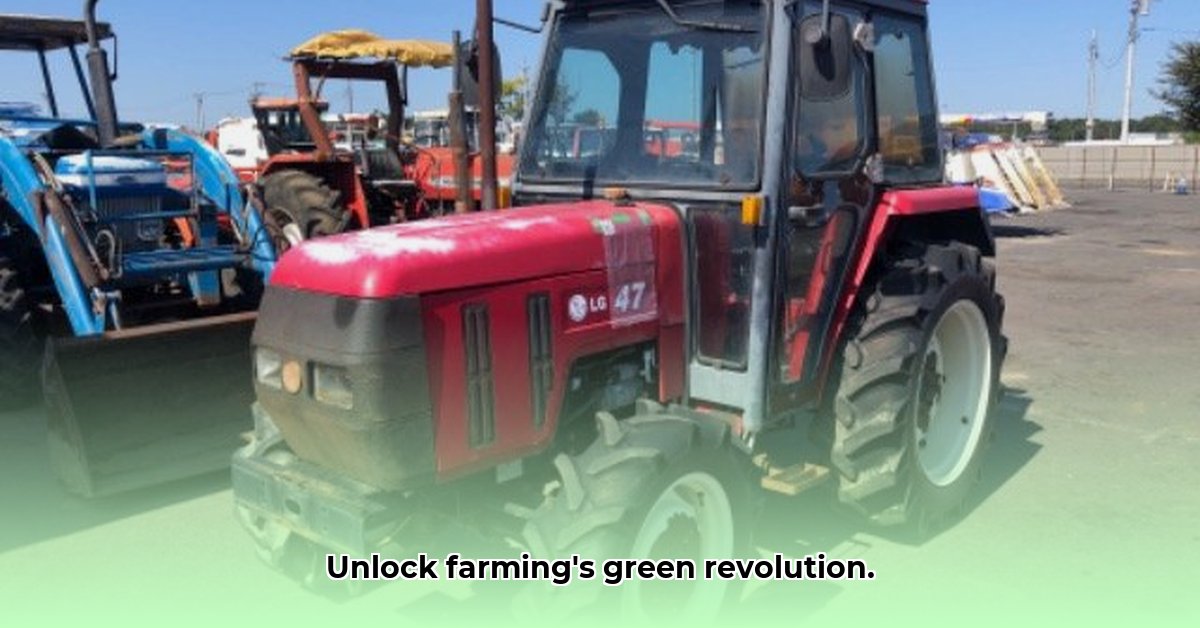
LS Tractors: A Legacy of Innovation in a Changing Landscape
The agricultural industry is undergoing a significant transformation, driven by the need for increased efficiency and sustainable practices. High-capacity tractors are at the forefront of this change, and LS Tractors (formerly LG Tractors) have long been a key player in this evolving market. However, the emergence of competitors like MT2 tractors introduces a new dynamic to the landscape. This necessitates a closer examination of LS Tractors' capabilities and how they stack up against the competition in terms of efficiency and sustainability. The demand for bigger, faster, and more technologically advanced tractors is undeniably growing, impacting the financial decisions of farmers, the strategies of manufacturers, and the overall sustainability of agricultural practices. For more on tractor costs, check out this helpful resource: tractor costs.
This analysis explores the key features of high-capacity tractors, focusing on efficiency enhancements and their contribution to sustainable farming. We delve into the competitive landscape, examining the strengths and weaknesses of LS Tractors compared to newer entrants like MT2. We also consider the broader implications for various stakeholders, including farmers, investors, and governmental bodies. Ultimately, we aim to provide a comprehensive picture of the high-capacity tractor market and its role in the future of sustainable agriculture. How can farmers best navigate this evolving landscape and select the right equipment to maximize their productivity while minimizing environmental impact? This is the question at the heart of our investigation.
Assessing the Impact of High-Capacity Tractors on Sustainability
High-capacity tractors, while increasing efficiency, present a complex relationship with sustainability. While their increased power allows for faster completion of tasks, potentially reducing overall fuel consumption per unit of work, their higher power output can also lead to greater fuel consumption in absolute terms. The impact on the environment is not solely determined by fuel efficiency. Other factors play crucial roles, including: the type of fuel used; the efficiency of farming practices employed in conjunction with the tractors; and the overall lifecycle of the tractor, from manufacturing to disposal.
Fuel Efficiency and Alternative Fuels: A Critical Evaluation
Fuel efficiency is a primary concern for environmentally conscious farmers. Tractors utilizing advanced engine technology that maximize fuel efficiency are essential for reducing greenhouse gas emissions. In addition, the adoption of alternative fuels like biomethane and biodiesel presents an opportunity to further reduce the environmental footprint of agricultural operations. However, the availability and cost-effectiveness of these alternative fuels vary significantly depending on geographic location and infrastructure. Therefore, a holistic approach that considers various factors is essential for a comprehensive assessment of a tractor’s environmental impact.
Precision Farming and Operational Efficiency
Precision farming techniques, such as GPS guidance and automated steering systems, significantly enhance operational efficiency. These technologies minimize fuel waste by optimizing field operations and reducing overlaps, leading to greater fuel efficiency and reduced environmental impact. However, the initial investment in these technologies can be substantial, making their adoption dependent on economic factors and access to reliable support. It is therefore crucial to fully analyze the cost of adoption versus the long term cost saving when comparing high-capacity tractors.
Comparing LS Tractors and MT2: A Market Analysis
Direct comparison of LS Tractors and MT2 tractors requires detailed specification data on key performance indicators (KPIs) such as fuel efficiency, maintenance costs, and long-term reliability, which is currently limited. While both brands represent the trend towards higher capacity machines equipped with advanced technologies, a comprehensive assessment of their relative strengths and weaknesses is essential for informed decision-making. This is especially true when considering the long-term implications from both an economic and an environmental standpoint. Further research specifically focused on fuel efficiency, maintenance costs, and environmental impact data is crucial for a conclusive comparison.
The Future of High-Capacity Tractors and Sustainable Agriculture
“The future of sustainable farming hinges on the adoption of innovative technologies and practices,” says Dr. Anya Sharma, Agricultural Engineering Professor at Cornell University. “High-capacity tractors, when coupled with precision agriculture techniques, have the potential to significantly reduce the environmental footprint of farming, but only if they are carefully selected and operated efficiently.”
The high-capacity tractor market is dynamic and highly competitive. The success of any given manufacturer depends on several key factors: cost-effectiveness, ease of use, technological sophistication, and ultimately, the long-term value it delivers to the farmer. This requires innovation not only in terms of engine technology and fuel efficiency but also in terms of overall system integration, incorporating smart technological features into overall operational efficiencies. The future will likely see continued innovation in alternative fuels, autonomous operation, and advanced data analytics, creating even more efficient and environmentally friendly farming practices.